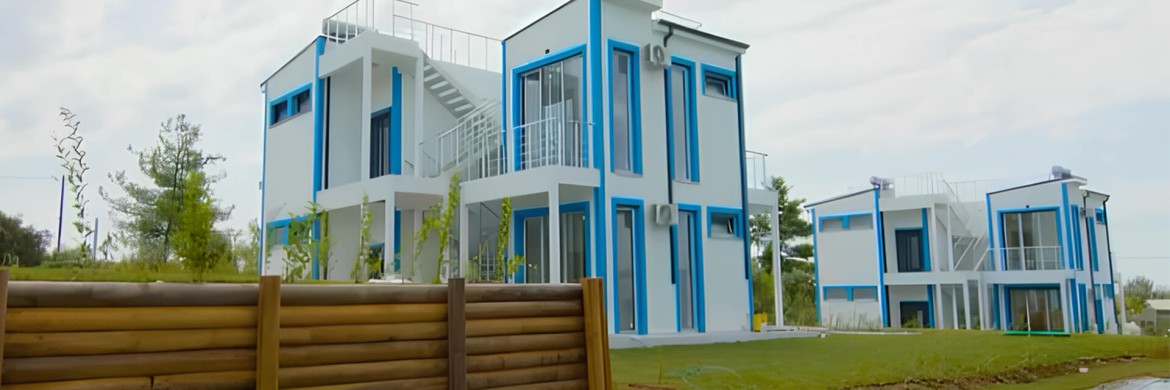How to Export Modular Buildings to the UK from Turkey
modular buildings uk export from Turkey represents a growing opportunity for manufacturers seeking new markets. This guide outlines the essential steps you must take to ensure your product meets British requirements and arrives at its destination in excellent condition. By understanding regulations, logistics, compliance, and market dynamics, you can successfully export modular buildings from Turkey to the United Kingdom.
Export Requirements for Modular Buildings to the UK
When planning to export modular buildings from Turkey to the UK, you need to consider both Turkish export policies and UK import regulations. Firstly, ensure that your facility in Turkey adheres to local building codes and certifications that have international recognition. These will form the basis of acceptance in UK border inspections. In addition, you must register for an EORI number if you don’t already have one, to move goods through UK customs. Export documentation from Turkey such as invoices, packing lists, and any origin certificates are also necessary.
Secondly, determine whether your modular buildings comply with UK planning permissions. The UK requires compliance with certain structural, fire safety, insulation, and accessibility standards. Any shipped units must meet UK building regulations. It’s essential to engage a UK-based technical consultant or certified third party who understands these regulatory requirements. Without compliance, your product could face delays or be rejected at UK ports.
Certification and Documentation Needed for Modular Buildings
For certification, you will often need an ISO 9001 quality management certificate to validate manufacturing standards. Fire safety certifications, thermal performance documentation, and structural load assessments are crucial. Also, electrical and plumbing installations inside the modules must be certified by recognized bodies accepted in the UK. CE marking still matters in some contexts, though after Brexit the UKCA mark is more relevant for construction products. If your modular buildings have any installed glazing or HVAC equipment, corresponding safety certifications are required.
Documentation includes export licenses from Turkish authorities, bill of lading, insurance paperwork, customs declarations, and certificates of origin. Technical drawings and material specifications may also be requested by UK trading partners. Ensure that all documents are translated into English where necessary. Proper documentation helps streamline customs clearance and avoids fines or rejections.
Logistics Planning for Exporting Modular Buildings
Shipping large modules requires careful route and carrier selection. Sea freight is typically the most cost-effective mode for heavy and oversized units. You need to choose ports in Turkey that can handle lift-on lift-off operations and UK ports that can accommodate large modular units without rework. Plan route timing, considering weather conditions that could disrupt marine transport.
Packaging and securing the structures is also critical. Modules must be designed with transport in mind: reinforced edges, weatherproof wrapping, and lashing points. Determine if parts will be shipped as whole buildings or partially disassembled for easier transport. Disassembly can lower shipping costs but adds assembly labor at the destination. Transport insurance should cover the full journey, including inland trucking in both Turkey and the UK.
Trade Regulations for Modular Buildings Between Turkey and the UK
Post-Brexit, UK import rules have diverged from EU regulations. You must comply with UK import tariffs, taxes (such as VAT), and customs checks. Verify whether your modular buildings are subject to anti-dumping duties or other trade measures. Check Preferential Trade Agreements or any trade deals between Turkey and the UK that could reduce tariffs or simplify documentation.
You also need to adhere to UK safety laws, which may enforce inspections or approvals on arrival. If using timber or wood products within your modular buildings, timber must meet phytosanitary requirements. Any materials considered controlled goods or hazardous need special permits. Regulatory authorities may also require conformity assessments, such as insulation materials’ performance under UK climate conditions.
Quality and Compliance Checks for Modular Buildings Before Shipment
Ensuring quality before shipping will prevent costly returns, rework, or reputational damage. Start with thorough production inspections in the manufacturing facility in Turkey. Check welding joints, structural strength, waterproofing, insulation installation, and finishes. Use onsite QA staff or third‑party auditors to verify that every module meets the contract specifications.
Before loading for transport, carry out final checks in a dry dock or staging area. Confirm that doors and windows seal correctly, electrical systems work, and any plumbing is leak‑free. Ensure that packaging materials are intact: protection against moisture, puncture, or deformation. Record test results and issue a certificate of final inspection that your UK customer or customs may request.
Technical Inspections for Modular Buildings
Technical inspections focus on structural integrity, load-bearing capacity, and resistance to environmental stresses. Modules must endure transport vibrations, wind, and handling loads. Conduct finite element analysis or other engineering assessments to prove performance. Check that flange weldings, frames, screws, and other connectors maintain designed tolerances.
Technical inspections also cover mechanical and electrical systems. All wiring should comply with UK wiring regulations (BS 7671) or its equivalent. Plumbing must adhere to UK water supply and sanitation standards. If modules include insulation or energy‑saving tech, verify R-values or U-values meet UK thresholds. These inspections are often done in lab settings or by certified inspectors.
Safety Standards Compliance of Modular Buildings
Safety goes beyond structure: fire resistance, safe exits, emergency lighting, and smoke detection are integral. Modules should conform to UK fire safety regulations, for example compliance with Approved Document B. For electrical safety, appliances and installations should be signed off with corresponding certificates; for example, a PAT test for appliances might be required. If modules will be installed in flood‑risk zones, additional waterproofing or structural reinforcement may be required.
Safety of materials matters: no toxic or prohibited substances, low VOC finishes, flame retardant fabrics for upholstery. If using composite materials or insulation boards, their fire rating must meet UK thresholds. Install safety rails, non‑slip surfaces, and guardrails where necessary. Documentation of safety testing helps when passing customs or local authority inspections.
Quality Certificates Required for Modular Buildings
Common quality certificates include ISO 9001 for quality management, ISO 14001 for environmental management if relevant, and bespoke certificates for fire resistance, thermal performance, and structural strength. For wiring, you may need UKCA marking or equivalent. Certification from accredited laboratories ensures credibility in the UK market.
Certificates of origin are also required, proving that the goods are made in Turkey. Some UK buyers may request specific material safety data sheets (MSDS) especially when chemicals, paints, or treated woods are used. Keep all certificate copies and ensure they match the shipped units. Mis‑matching serial numbers or specifications causes delays or rejections.
Business and Market Considerations for Modular Buildings in the UK
The UK market for modular buildings is competitive, driven by affordable housing, pop‑up offices, schools, and healthcare facilities. Understanding customer preferences is essential: UK buyers expect high quality, sustainability, efficient thermal performance, and good design. Pricing must reflect transport costs, tariffs, and compliant finishes. Local customer service or partnership arrangements often help.
Also, assess local demand in different regions—for example London has different climate and planning constraints than Scotland. Consider whether to supply raw modules or offer full installation services. After‑sales support and maintenance become key differentiators. Marketing should highlight any green credentials, such as low carbon materials or energy efficiency, as UK consumers increasingly demand sustainable construction solutions.
Common Challenges and Solutions in Exporting Modular Buildings
When exporting modular buildings turkey‑based manufacturers often face delays at customs due to improper documentation or non‑compliance with safety standards. One solution is to prepare all certificates well in advance and engage UK consultants to pre‑validate compliance. Another challenge is damage in transit: oversized units may be damaged by road or sea movements. Using robust packaging, shock absorbers, and careful loading can mitigate that risk.
Currency fluctuations and changing tariffs also pose uncertainty. To solve this, fix contracts with clauses to manage cost variations or hedge currency risk. Logistics coordination may break down if inland transport in Turkey or the UK is disrupted. Building relationships with reliable freight forwarders and having contingency plans for alternate routes help maintain schedules.
Handling Delays in Modular Buildings Delivery
Delays happen due to customs inspections, missing documentation, or regulatory changes. To minimize delays, conduct pre‑shipment audits and ensure your Turkish factory issues all required documentation correctly and in English. Keep communication open with UK import agents or customs brokers. Buffer time in your schedule for unexpected hold‑ups.
Also, consider warehousing options in the UK to store modules close to the delivery site ahead of installation. This reduces the impact of unpredictable land transport delays at destination. Regular tracking using GPS or other tracking technologies helps in detecting delays early and responding proactively.
Minimizing Damages During Transport of Modular Buildings
Transport damage is a serious risk for bulky structures. Reinforce corners and edges, protect openable parts with secure covers. Use corrosion‑resistant materials or coatings where modules may be exposed to salt spray or moisture. For road legs or base supports, ensure they are well braced.
During loading and unloading, use certified lifting equipment and trained personnel to avoid mishandling. Secure modules to ship benches or trailers with straps and braces to prevent shifting. Insure full value with transport insurance that covers all modes – sea, road, and handling. Document condition before shipment with photographs to support any claims.

